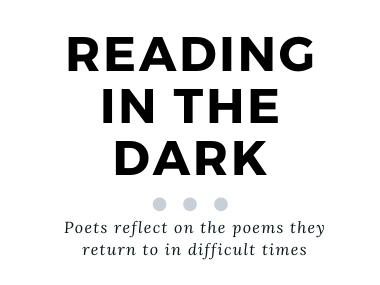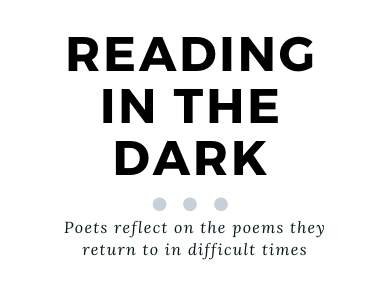Reading in the Dark
Rae Armantrout on William Carlos William’s “By the road to the contagious hospital”

Spring and All [By the road to the contagious hospital]
I
By the road to the contagious hospital
under the surge of the blue
mottled clouds driven from the
northeast-a cold wind. Beyond, the
waste of broad, muddy fields
brown with dried weeds, standing and fallen
patches of standing water
the scattering of tall trees
All along the road the reddish
purplish, forked, upstanding, twiggy
stuff of bushes and small trees
with dead, brown leaves under them
leafless vines-
Lifeless in appearance, sluggish
dazed spring approaches-
They enter the new world naked,
cold, uncertain of all
save that they enter. All about them
the cold, familiar wind-
Now the grass, tomorrow
the stiff curl of wildcarrot leaf
One by one objects are defined-
It quickens: clarity, outline of leaf
But now the stark dignity of
entrance-Still, the profound change
has come upon them: rooted, they
grip down and begin to awaken
From Spring and All (New Directions). Copyright © 1962 by William Carlos Williams.
In response to the Coronavirus pandemic, we asked poets to write about the poems they return to in difficult times—to find solace, perspective, or even a moment of delight. Subscribe to the PSA newsletter for more Reading In The Dark responses and to keep updated with the PSA.
I think there is strength, patience, and joy to be found in Spring and All by William Carlos Williams. The poems in the book are numbered, not titled, and I want to look at poem #1, which begins “By the road to the contagious hospital.” As many of you know, Williams was a doctor, working in the era before antibiotics. When he says, “the contagious hospital,” he is likely referring to a separate building or wing for people with contagious diseases. Then, as now, doctors had to expose themselves to infection. He probably saw too many patients who could not be helped. Sometimes he needed to turn his gaze elsewhere. Like many poets, it seems William Carlos Williams stopped to make notes on what he saw along his path. It’s quite possible he was writing around this time of year. The poem is about very early spring; it begins with a cold wind and a “surge of the blue / mottled clouds from the / northeast…” One thing I have always admired about this writing is the unexpected word choice. Where else do you see clouds described as “blue” or “mottled?” Where else do you hear that they are “surging?” And yet those are perfectly apt terms.
The poem moves next to discuss the plants by the roadside. Williams seems to struggle to see them clearly at first; he searches to find the right words. We can feel this effort in the rush of adjectives. We see “the reddish / purplish, forked, upstanding, twiggy / stuff of bushes and small trees.” Things are still undefined, in flux. They are “stuff.” As the poem progresses, Williams moves from observation to imagination or even empathy. Each year, plants enter a “new world, naked / cold, uncertain of all / save that they enter”—like the babies he delivered perhaps—or like people in an unprecedented situation. But gradually things get clearer. “One by one objects are defined / It quickens…”. How interesting that Williams uses the word “it” there, instead of “they.” He capitalizes this “It” for emphasis, though he doesn’t generally capitalize words at the beginnings of lines. To “quicken” means to accelerate but it also means to come to life. I think this quickening “it” includes the plants he’s observing, but moves beyond them too. Each reader must decide for herself what he’s referring to. The book title isn’t Spring, it’s Spring and All. I’d say the poem invokes fresh perception as well as seasonal growth. Awareness sharpens; energy returns. He is talking about plants and humans when he writes, “…rooted they / grip down and begin to awaken."
—Rae Armantrout
Rae Armantrout's collection, Versed (2009), received the Pulitzer Prize, the National Book Critics Circle Award, and was a finalist for the National Book Award. Her latest book, Wobble, published in 2018, was also a finalist for the National Book Award.

